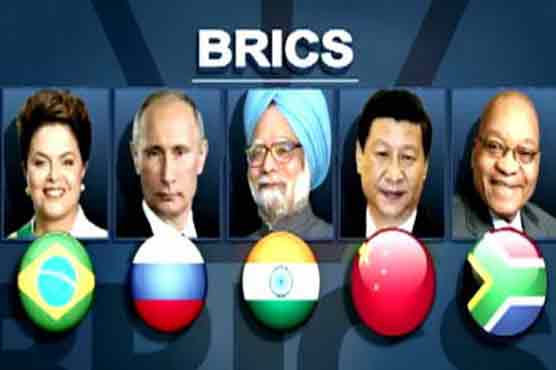China, Brazil sign local currency trade deal

An agreement was signed Tuesday to do billions of dollars of trade in their local currencies.
DURBAN, South Africa (AP) -, as the five-nation BRICS forum of emerging market powers work to lessen dependence on the U.S. dollar and euro.
Finance ministers Lou Jiwei of China and Guido Mantega of Brazil signed the agreement ahead of the official opening of a summit of the leaders of Brazil, Russia, India, China and South Africa.
It is Chinese President Xi Jinping s first official trip to Africa, and the first BRICS summit since Vladimir Putin was returned to the Kremlin as president of Russia.
The first four countries established the forum in 2009, amid the economic meltdown in the West, saying they were uniting to work toward a more equitable world economic order and one that makes them less dependent on the volatility of the U.S. dollar and the euro. South Africa joined the forum two years ago.
As the euro crisis continues and the West shows little signs of growth, the World Bank says that global economic growth is increasingly dependent on the BRICS countries, which account for 27 percent of global purchasing power and 45 percent of the world s workforce.
China already has become Africa s biggest trading partner, overtaking traditional colonial partners from Europe, and BRICS countries aim to continue increasing trade among themselves. Intra-BRICS trade flows have ballooned to $282 billion last year from $27 billion in 2002.
This week s fifth BRICS summit is concentrating on Africa with the theme "BRICS and Africa: A partnership for development, integration and industrialization" and South Africa has invited more than 20 African leaders to join the discussion.
The forum will be working to boost and enrich ties with Africa, yet at the same time all non-African members are competitors for Africa s resources, especially oil and coal for energy.
The conference comes as some ask whether Africa is sliding into a neo-colonial relationship with China, which is basically buying the continent s raw minerals and oil while exporting it manufactured goods, following a pattern set when Africa was colonized by European nations.
Brazil confronts the same challenge, according to its foreign trade minister Fernando Pimentel, who spoke in a pre-summit teleconference.
"China is our biggest trade partner but we basically export mineral and agricultural commodities to China, which is something we would like to change.
We would like to improve our export portfolio to China to add more industrialized products," Pimentel said.
Tuesday s agreement with China involves using local currencies for up to $30 billion of his country s trade with China, nearly half its annual $75 billion trade with Beijing, said Brazil s Finance Minister Mantega. He said Brazil hopes to promote such arrangements with other countries.
Several other agreements are expected to be signed during the two-day summit in South Africa s coastal resort city of Durban, including in defense, education, energy, science and technology, agriculture and transport, according to South African President Jacob Zuma.
South African ministers have said they are hopeful of agreement to establish a BRICS development bank, though many modalities still have to be worked out.
Pimentel of Brazil said he expects leaders to approve the creation of a development bank, agreement on technical issues might delay any signing at the Durban summit.
He said the countries have basically agreed on setting up a bank with seed capital of $50 billion, but how much each country would contribute and the voting structure of the board had yet to be defined.
Pimentel said the bank would not operate in competition to the International Monetary Fund, but noted the BRICS opposition to Western dominance of the IMF and the World Bank.
"The world has a new economic bloc that is the driver of current global growth, and we see that it is underrepresented in the governance structure in the IMF and maybe this is a challenge the IMF itself has to face over the new few years," Pimentel said.
BRICS members would have to beware of China dominating a BRICS bank in the same way, said financial analyst Simon Freemantle of Standard Bank of South Africa.


